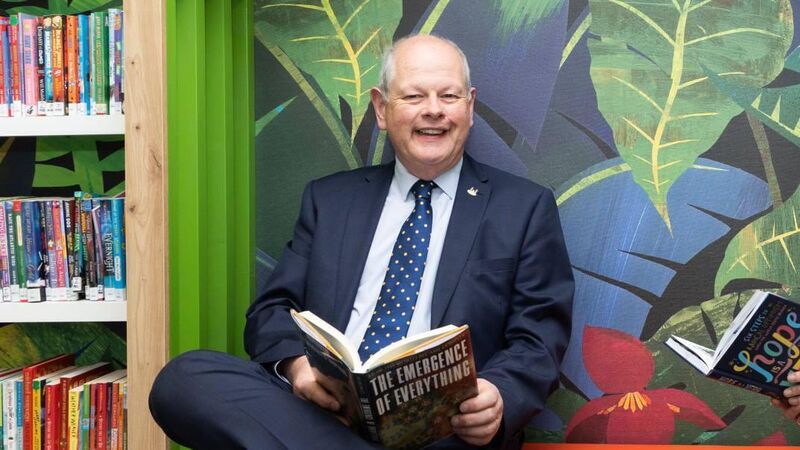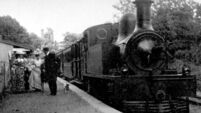Cork Views: Discover wonders of Cork’s brilliant libraries

Cork City Librarian David O’Brien adopts a cradle-to- grave philosophy on libraries
A wise teacher told me once that if you want to know the core values of a school and the importance placed on thinking and reading, let it show you its library.
This was said to me, an English literature graduate, in the context of secondary schools in England when I was interviewing for a job there more than 15 years ago, where schools have large student populations and generally more building space to play with. It was also when libraries were diminishing in value.
But it was a thought that stayed with me and, since coming to Ireland in 2019, I have found myself applying it to the level of the country and county.
I come from a place where there are far fewer libraries than there were when I was growing up, when I happily picked out books set in the 1880s, the Little House and What Katy Did Next series among them, such was my preference for time travel.
It would have been impossible to imagine as a child that libraries in England could be thrown into crisis, with nearly 200 closing or losing public funding as of 2024, depriving communities of all that they have to offer.
It is different here. Ireland continues to invest in its libraries, with 330 nationwide and 40 in Co. Cork alone. I still feel a warm buzz driving through a town I haven’t been to before and spotting its library, often sitting centre stage. I expect to see one nearly everywhere I go.
And that’s not all. I was delighted to discover that mobile libraries exist, rolling through rural villages on a fortnightly basis, dropping off books to local residents, sometimes quite literally on their doorstep, and allowing them to return the ones they’ve read without trekking to the nearest town.
A pile of books I had requested were once left for me behind the counter of my local shop when I wasn’t around to pick them up.
A library is a community hub as well as a gateway to other lives and shared experiences, on the page and off, with book clubs, writers’ groups, Lego clubs, STEM sessions for kids, toddler music classes, storytime and special interest groups.
They are places of warmth, offering free wifi, access to printing services and computers and study and work hubs.
Nothing is demanded of anyone using a library. It is there for everyone. Moreover, you don’t have to worry if you forget to return a book (or a movie) on time: there are no late fees, just polite email reminders that an item needs returning.
This is helpful when you’ve mixed up the books that live in your house with ones that actually belong to the library.
Cork was the first city in Ireland to adopt the Public Libraries Act (1885), though it did not establish a library until 1892. The first, purpose-built Carnegie Free Library, which moved from various locations to Anglesea Street in 1905, was destroyed in the Burning of Cork. The tenacity of librarian James Wilkinson and generous donations and support from Corkonians in Ireland and all over the world saw the construction of what we know today as the ‘City Library’ on Grand Parade. It remains an intrinsic part of Cork’s history and identity.
The challenges it faces today are the same as they are for libraries across Ireland and most other countries: how to ensure younger generations remain engaged.
David O’Brien, Cork City Librarian since 2020, adopts a cradle-to-grave philosophy whereby a person journeys through the library throughout their lifetime, their relationship with it perhaps changing as life unfolds. Sometimes they drift away from it but there is always a chance to come back. The library has sought to position itself as a constant in people’s lives.
“Schools get people in here,” O’Brien says. This is easier to accomplish in national school but becomes harder, he notes, when children reach secondary school age. The solution has been to create a system where children’s and young adult fiction is housed in a separate room but which allows young people to access adult fiction in the main part of the library when they are ready. It is about providing everything they need and then waiting to see what they will do, says O’Brien.
Funding is ring-fenced specifically for young people with a dedicated officer responsible for youth engagement stationed in each of the city’s 10 libraries.
Literacy, as well as digital literacy and a yearly Children’s Literary Festival, are key staples. The Annual Teen Graphic Novel Collection also collates young authors’ and illustrators’ work, honed during a series of workshops, to make a comic book.
The popular Unfinished Book project, meanwhile, has been publishing poems from young writers from secondary schools across Cork city since 2005. Then there is an annual Teen Short Story Writing competition, with the winner announced on Teen Day.
Aware of the need to evolve and capture interests while competing with digital attractions, O’Brien has also overseen the creation of a music library, which allows young people to listen to music with noise cancelling headphones. A six-week event course led by a DJ has proved popular as has an instrument lending scheme. Guitars, for example, can be borrowed for up to six months, giving budding musicians access to the equipment they need or might like to try. A drum-kit has yet to find a temporary home but O’Brien expects it will. The scheme has been especially well-received by International Protection students.
Plans are afoot for an electric van with a door-to-door service to reach vulnerable people.
“People think it’s just old people who are vulnerable,” O’Brien says, “but it’s not.”
Anyone can be vulnerable, for any number of reasons. The van will also be able to visit nursing homes and bring the joy of reading and the sharing of stories to elderly residents.
O’Brien, who is now in his sixties, has been involved with libraries all his life. He has seen it all and knows that for libraries to survive and continue to thrive, it is necessary to have one eye open, to be innovative and to be on the ground. He agrees that what happens inside a library’s often imposing front is what matters most, particularly for young people.
“It’s giving them a place,” O’Brien says, “where they can safely come, to sit, to read, to relax and chat to their buddies.”







 App?
App?




